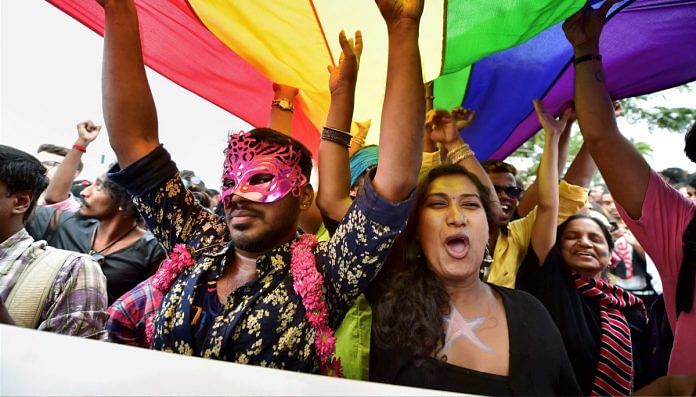Remember that Section 377 doesn’t criminalise ‘gay sex’ — it is the product of a homophobic mindset that targets queer people.
Monday brought with it the welcome news that the Supreme Court of India will revisit its decision upholding Section 377 of the Indian Penal Code, a law that is so breathtakingly obsolete and discriminatory it is a wonder that we still have to contend with it.
The news reports all say the same thing: a three-judge bench, led by Chief Justice Dipak Misra, has referred the matter to a larger bench, which will re-examine the constitutional validity of Section 377. This much is accurate, although I will leave it to lawyers and legal journalists to expand on what the implications of this are in an already tumultuous and uncertain legal journey, especially as other petitions on the same subject are pending before the court.
What many of the reports also say, however, is slightly more dubious and certainly simplistic. They claim that Section 377 “criminalises homosexuality” — or worse, “gay sex”, whatever that means (Is there a prescribed way in which queer people are meant to have sex? If yes, who wrote the manual?). This kind of reporting only serves to increase polarised ideas about sexuality and sexual practices, and further alienate people who have non-normative sexual orientations and gender identities.
As media professionals, we have the responsibility to introduce nuance into our reporting of sensitive issues such as sexuality, instead of chasing pithy headlines and hashtags that reinforce inaccurate notions and stereotypes. We need to be aware of the rich and varied queer history in South Asia, and report from a place of sensitivity and accuracy.
The relationship between the law and its use against queer folks is not so linear. Section 377 was instituted by the colonial government in 1860, and criminalises ‘carnal intercourse against the order of nature’. It clearly espouses Victorian ideals about what sex and sexuality are, and what is ‘natural’ or ‘unnatural’. This may seem evident, but it feels important to reiterate that this includes many sex acts that heterosexual couples perform, such as oral and anal sex.
As Akhil Katyal reminds us in this memorable poem, Section 377 does not just criminalise consensual sex between queer people. It’s unclear what it does not criminalise — one imagines the only sexual act that the makers of 377 considered ‘natural’ is missionary position, procreative peno-vaginal intercourse between a heterosexual couple. Technically, straight folks who’re into anything else aren’t off the hook.
However, it is in the spirit of the law that folks who identify under the LGBTQ spectrum become its targets. Privilege protects heterosexual people from being victimised by Section 377 — in fact, in at least one horrific case, it has even led to them walking away scot free after committing a grave crime. It is stigma and discrimination that have led to the use of Section 377 as a tool to criminalise queer intimacy — and this prejudice extends far beyond the law. It is what shaped the law and allowed its survival in the first place.
Since 2001, when the Naz Foundation originally filed a PIL in the Delhi High Court asking for Section 377 to be struck down, the communities who have been targeted by this archaic law have been repeatedly let down by the country’s courts. This has been consistently true except for one brief and brilliant moment in 2009, when the High Court saw sense and did strike it down.
However, if it was not already clear as day before, it has become increasingly evident after the Supreme Court’s judgment acknowledging the fundamental rights of transgender people and the right of privacy that Section 377 is not, in fact, constitutionally valid.
The NALSA judgment is meant to protect the rights of trans people, and these rights cannot be protected if the sexuality of queer trans people is criminalised. And the right to privacy judgment clearly states that sexual orientation lies at the core of several fundamental rights guaranteed to all Indian citizens under the Constitution.
It is time to pay careful attention to what the members of the ruling dispensation have to say on the matter. In the past, they have contradicted themselves — but in effect, they have not acted in the interests of the queer and trans communities when the chance has presented itself. Shashi Tharoor’s private member’s bill against 377 was quashed twice, in 2015 and 2016. And their stance on the rights of transgender people has been made evident by their mishandling of the trans rights bill and the disastrous shape it has taken.
The earliest and clearest indication of their continued homophobia has come in the form of a comment by MP Subramaniam Swamy, who argues that Section 377 is needed to ‘punish’ queer people who ‘flaunt’ their sexuality. This is a disgusting and irresponsible statement that reflects a lack of respect for the basic workings of democracy and human rights, and needs to be condemned. Attitudes such as Swamy’s, which reek of homophobia, will have to be challenged and dismantled even after Section 377 is finally struck down. But as a first step, Section 377, which has absolutely no place in a democracy, needs to go.
Shreya Ila Anasuya is a writer, journalist and the Managing Editor of Skin Stories at Point of View. She tweets at @shreyilaanasuya




Hindus don’t have a problem.
ONLY Muslims & Christians have such problems against LGBT due to their intolerant beliefs.